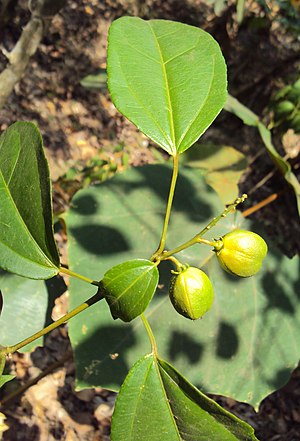Note: This is a project under development. The articles on this wiki are just being initiated and broadly incomplete. You can Help creating new pages.
Croton tiglium
Croton oil plant is an erect, evergreen shrub or small tree. It grows up to 7 metres tall. The plant has a very long history of herbal use, being employed as a powerful laxative and as an oil to treat a wide range of skin problems. It has been grown for these uses for more than 2,000 years and is still often cultivated nowadays. The plant is also sometimes grown as an ornamental.
Contents
- 1 Uses
- 2 Parts Used
- 3 Chemical Composition
- 4 Common names
- 5 Properties
- 6 Habit
- 7 Identification
- 8 List of Ayurvedic medicine in which the herb is used
- 9 Where to get the saplings
- 10 Mode of Propagation
- 11 How to plant/cultivate
- 12 Commonly seen growing in areas
- 13 Photo Gallery
- 14 References
- 15 External Links
Uses
Tumours, Cancerous sores, Carbuncles, Colds, Dysentery, Fever, Paralysis, Scabies, Schistosomiasis, Snakebite, Sore throat.
Parts Used
Chemical Composition
Common names
| Language | Common name |
|---|---|
| Kannada | |
| Hindi | |
| Malayalam | |
| Tamil | |
| Telugu | |
| Marathi | |
| Gujarathi | |
| Punjabi | |
| Kashmiri | |
| Sanskrit | |
| English |
Properties
Reference: Dravya - Substance, Rasa - Taste, Guna - Qualities, Veerya - Potency, Vipaka - Post-digesion effect, Karma - Pharmacological activity, Prabhava - Therepeutics.
Dravya
Rasa
Guna
Veerya
Vipaka
Karma
Prabhava
Habit
Identification
Leaf
| Kind | Shape | Feature |
|---|---|---|
Flower
| Type | Size | Color and composition | Stamen | More information |
|---|---|---|---|---|
| {{{5}}} |
Fruit
| Type | Size | Mass | Appearance | Seeds | More information |
|---|---|---|---|---|---|
Other features
List of Ayurvedic medicine in which the herb is used
Where to get the saplings
Mode of Propagation
How to plant/cultivate
A plant of the lowland tropics and subtropics, it tolerates an annual rainfall of 600 - 1,200 mm and an annual temperature in the range 21 - 27.5°c.[3]
Commonly seen growing in areas
Montane sparse forests, Limestone shrublands, Wide range of vegetation and soil.
Photo Gallery
References
- ↑ [Chemistry]
- ↑ [Morphology]
- ↑ Cultivation
Cite error: <ref> tag with name "Uses" defined in <references> is not used in prior text.
External Links
- [ ]
- [ ]
- [ ]
- Pages with reference errors
- Ayurvedic Herbs known to be helpful to treat Tumours
- Ayurvedic Herbs known to be helpful to treat Cancerous sores
- Ayurvedic Herbs known to be helpful to treat Carbuncles
- Ayurvedic Herbs known to be helpful to treat Colds
- Ayurvedic Herbs known to be helpful to treat Dysentery
- Ayurvedic Herbs known to be helpful to treat Fever
- Ayurvedic Herbs known to be helpful to treat Paralysis
- Ayurvedic Herbs known to be helpful to treat Scabies
- Ayurvedic Herbs known to be helpful to treat Schistosomiasis
- Ayurvedic Herbs known to be helpful to treat Snakebite
- Ayurvedic Herbs known to be helpful to treat Sore throat
- Herbs with Seeds used in medicine
- Habit - Evergreen tree
- Index of Plants which can be propagated by Seeds
- Index of Plants which can be propagated by Cuttings
- Herbs that are commonly seen in the region of Montane sparse forests
- Herbs that are commonly seen in the region of Limestone shrublands
- Herbs that are commonly seen in the region of Wide range of vegetation and soil
- Herbs
- Pages without herbs images



